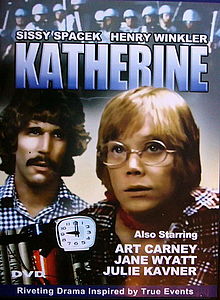Katherine aka The Radical (1975) ****
Originally broadcast on television, this worthwhile film asks how a rich college girl from a respectable family could grow to so hate the society that has given her every advantage that she winds up as a bitter domestic terrorist and founding member of the murderous Weathermen Underground. A pre-Carrie Sissy Spacek stars as the title character, with an unusually energetic Henry Winkler playing her quirky lover and fellow subversive. To its credit, the film stops short of glorifying revolution, but it does humanize the aspirants in giving a glimpse into their experiences and motivations. Balancing this, however, is the sympathetic portrayal of Katherine’s conservative parents (Art Carney and Jane Wyatt), who disapprove of their daughter’s decisions but love her and only want to help. Rounding out the cast is Julie Kavner, future voice of Marge Simpson, as one of Katherine’s college friends whose life follows an entirely different course. Some of the music is poor, but the film is recommended to anyone interested in the young stars or the radical politics of the period.
4 out of 5 stars.
The KGB Connections (1982) ****1/2
Before Michael Moore and reality television programs popularized the obnoxious, attention-grasping gonzo approach, the documentary used to be a consistently fascinating and dignified form of filmmaking. Thankfully, The KGB Connections, an old-school black-and-white CBC documentary, hails from the days when stark truth was all that was necessary to hold the viewer’s attention. Consisting largely of interviews with CIA men and defectors from communist intelligence services, the film exposes shocking breaches of national security by the KGB, which utilized diplomatic missions (particularly the UN, described as a “nest of spies”) and “illegals”, spies smuggled into the country under false identities, to increasingly undermine U.S. interests throughout the sixties and seventies and into its last decade of existence. If the film is to be believed, the Soviets even had the ability to monitor the phone calls at the White House and the Pentagon using harmless-looking antennae mounted on their consulate buildings.
The most amusing interviewee is easily Hedda Massing, who during the 1930s was one of the Soviet Union’s most distinguished recruiters of influential American citizens. Massing and former communist Nathaniel Weyl dish the dirt on traitors Laurence Duggan, Noel Field, and Alger Hiss. Also of interest is KGB proxy activity through Cuban intelligence and the recruitment and training of young American terrorists like the Weathermen. There is a spareness to The KGB Connections that will probably not appeal to those with short attention spans, but history buffs and the politically aware will want to take the time to digest its abundance of information. The unsettling electronic musical stings that introduce the different segments do much to enhance the film’s real eeriness.
4.5 out of 5 stars.


